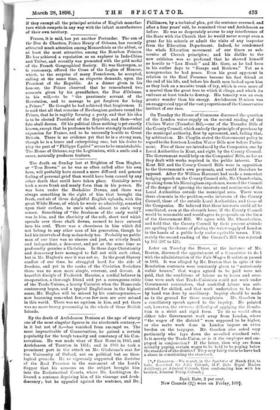By the death of Archdeacon Denison at the age of
ninety one of the most singular figures in the nineteenth century,— in it but not of it,—has vanished from amongst us. The most impracticable of Conservatives, he gained a certain popularity for the tough tenacity and constancy of his Con- servatism. He was made vicar of East Brent in 1843, and Archdeacon of Taunton in 1851; and in 1865 he took a prominent part in the attack on Mr. Gladstone's seat for the University of Oxford, not on political but on theo- logical grounds. He so vigorously supported the doctrine of the Real Presence in the sacrament of the Lord's Supper that his sermons on the subject brought him into the Ecclesiastical Courts, where Dr. Lushington de- livered a sentence depriving him of his vicarage and Arch- deaconry ; but he appealed against the sentence, and Dr.
Phillimore, by a technical plea, got the sentence reversed, and after a four years' suit, he remained vicar and Archdeacon as before. He was so desperately averse to any interference of the State with the Church that he would never accept even a grant for his schools or admit the visits of any inspector from the Education Department. Indeed, he condemned the whole Education movement of our times as sub- versive of Church principles ; and his dislike to the new mitioism was so profound that he showed himself as hostile to " Lux Man& " and Mr. Gore, as he had been in his earlier days to "Essays and Reviews." Yet as a nonagenarian he had peace. Even his great opponent in relation to the Real Presence became his fast friend at the end of his life, and before his death men looked upon him as they look on a massive trunk of ivy, which is even more of a marvel than the great tree to which it clings, and which its embrace at least tends to destroy. His tenacity was an even greater wonder than his energy. Archdeacon Denison was an exaggerated type of the vast proportions of the Conservative instinct of our race.






































 Previous page
Previous page